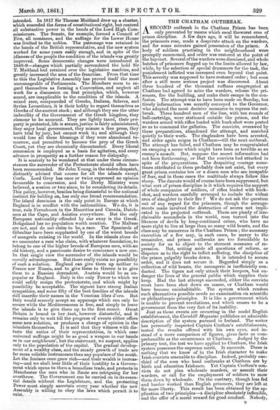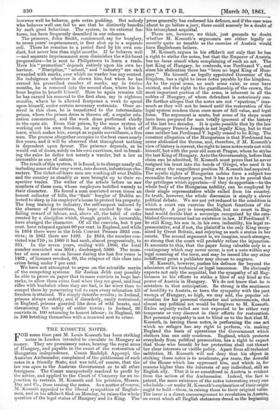THE CHATHAM OUTBREAK.
11 only outbreak in the Chatham Prison has been only prevented by means which meal theworst eras of prison discipline. A few days ago it will be remembered, the prisoners rose, made a desperate attack on the warders, and for some minutes gained possession of the prison. A body of soldiers practising in the neighbourhood were promptly summoned, and order was restored at the point of the bayonet. Several of the warders were dismissed, and whole batches of prisoners flogged up to the limits allowed by law, while, by the selection of special drummers for the task, the punishment inflicted was increased even beyond that point. This severity was supposed to have restored order ; but soon after a still more serious project was discovered. About three hundred of the thousand ruffians congregated at Chatham bad agreed to seize the warders, release the pri- soners, fire the building, and make their escape in the con- fusion. The attempt was to have been made on Sunday, but timely information was secretly conveyed to the Governor, who adopted the most decisive measures to repress the out- break. Three hundred men of the line, with ten rounds of ball-cartridge, were stationed outside the prison, and the warders armed with rifles loaded with buck-shot were posted so as to command the galleries. The convicts, overawed by these preparations, abandoned the attempt, and marched quietly to their work. The ringleaders have been arrested, 8,nd order again reigns in Chatham—till the next outbreak. The attempt has failed, and Chatham may be congratulated on escaping a scene which might have been as terrible as an enemy's assault. But, suppose the secret information had not been forthcoming, or that the convicts had attacked in spite of the preparations. The despairing courage some- times attributed to, them probably does not exist, but every great prison contains ten or a dozen men who are incapable of fear, and in these cases the multitude always follow like sheep. The eineute would of course have been suppressed, but what sort of prison discipline is it which requires the support of whole companies of soldiers, of rifles loaded with buck- shot, and warders carefully arranged to include the widest area of slaughter in their fire ? We do not ask the question out of any regard for the prisoners, though the arrange- ments made involved the destruction of scores not impli- cated in the projected outbreak. There are plenty: of irre- claimable scoundrels in the world, men turned into the likeness of devils by long-continued crime, who have no more right to live at large than so many wild beasts, and the class may be numerous in the Chatham Prison ; the summary execution of a few may, in such cases' be mercy to the remainder, and prison outbreaks are too formidable to society for us to object to the sternest measures of re- pression. But, setting aside all questions of reform, or disputes as to the right to inflict suffering, the discipline of the prison palpably breaks down. It is intended to secure order, and it does not secure it. Regarded simply as a collection of wild beasts, the menagerie is inefficiently con- ducted. The tigers not only attack their keepers, but en- danger the lives of the general public which supplies their keep. Had the last attempt succeeded, either the convicts must have been shot down en masse, or Chatham would have become uninhabitable. The system which renders such alternatives possible needs no examination on scientific or philanthropic principles. It is like a government which is unable to prevent revolutions, and which ceases to be a government from the very fact of its inability. Just as these events are occurring in the model English establishment, the Cornhill Magazine publishes an admirable description of the system pursued in Ireland. The writer has personally inspected Captain Crofton's establishments, tested the results offered with his own eyes, and in- stead of a mere comparison of figures, gives facts as com- prehensible as the occurrences at Chatham. Judged by the primary test, the test we have applied to Chatham, the Irish system possesses the supreme merit. It succeeds. There is nothing that we know of in the Irish character to make Irish convicts amenable to discipline. Indeed, probably one- third of the men who head outbreaks at Chatham are by birth and education Irishmen. Yet Captain Crofton's con- victs do not plan wholesale murders, or assault their warders, or call for the employment of soldiers to mow them down by wholesale. On the contrary, though less fed and harder worked than English prisoners, they are left at far more liberty. This result has been obtained by the ap- plication of two principles—a discipline absolutely inflexible, and the offer of a moral reward for good conduct. Nobody, however well he behaves, gets extra pudding. But nobody who behaves well can fail to see that he distinctly benefits by such good behaviour. The system, in its external fea- tures, has been frequently described in our columns. The prisoner, John Smith, condemned, say for burglary, to seven years' imprisonment, is first shut up in a separate cell. There he remains to a period fixed by his own con- duct, but never less than eight months. If he behaves well —and separate imprisonment soon diminishes the wild-beast propensities—be is sent to Philipstown to learn a trade. Here his "promotion" depends entirely upon his own be- haviour. "Discipline," "school," and "industry" are each rewarded with marks, over which no warder has any control. No indulgence whatever is shown him, but when he has earned his prescribed number of marks, say in twelve months, he is removed into the second class, where his la- bour begins to benefit himself. Here he again remains till he has earned his removal to the first class, say in eighteen months, where he is allowed fourpence a week to spend upon himself, under certain necessary restraints. Once ar- rived in this class, be is transferred to the intermediate prison, where the prison dress is thrown off, a regular edu- cation commenced, and the work done performed chiefly in the open air. From this prison, by the same system of working out his own freedom, he may obtain a ticket of leave, which makes him, except as regards surveillance, a free man. The process altogether occupies in the best cases nearly five years, and it will be observed that throughout nothing is dependent upon favour. The prisoner depends, as he would out of doors, solely on his own exertions, and in break- ing the rules he defies not merely a warder, but a law as inexorable as one of nature.
The result of this system, it is found, is to change nearly all, including some of the very worst, into decent, industrious cha- racters. The ticket-of-leave men are working all over Dublin and the country as 'steadily as men brought up to their re- spective trades. The writer of the article before us saw numbers of these men, whose employers testified warmly to their character. He found a man convicted seven times an honest collector of bills, the "flash" burglar of Dublin se- lected to sleep in his employer's house to protect his property. The long training to industry, the self-respect induced by the absence of favouritism, the hope excited by the un- failing reward of labour, and, above all, the habit of order created by a discipline which, though gentle, is inexorable, have changed the character. Of all the convicts, but 8 per cent. have relapsed against 90 per cent. in England, and while in 1854 there were in the Irish Convict Prisons 3933 con- victs; in 1861 there are 1492. In 1854, the number con- victed was 710; in 1860 it had sunk, almost progressively, to 331. In the seven years, ending with 1860, the total number convicted was 3054; discharged, 5560. The num- ber of men sent out on license during the last five years is 1462; of licenses revoked, 89, the relapses of this class into crime being under 7 per cent.
We have not attempted to argue on the scientific merits of the competing systems. Sir Joshua Jebb may possibly be able to prove on paper that to mass convicts in huge bar- racks, to allow them extra food when they are good, and load rifles with buckshot when they are bad, is far wiser than to compel them by persevering toil to earn every relaxation till freedom is attained. We simply describe results ; in Ireland, prisons always orderly, and if disorderly, easily restrained; in England, prisons guarded like dens of wild beasts, and threatening the safety of entire towns ; in Ireland, 92 convicts in 100 returning to honest labour; in England, 90 in 100 betaking themselves with a renewed zest to crime.































 Previous page
Previous page